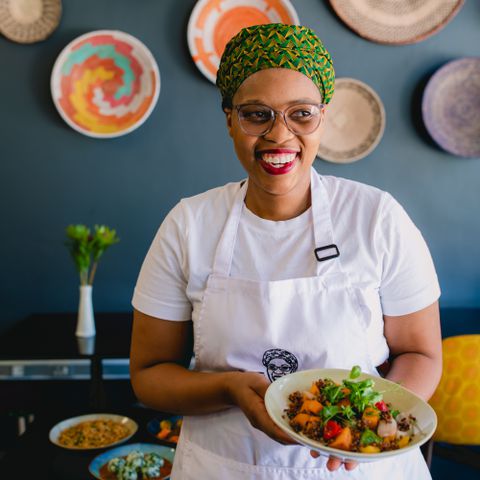A wave of homegrown chefs are telling their stories on the plate in the South African city.

Courtesy of Ellerman House
During the fourth course of the tasting menu at Emazulwini Restaurant in Cape Town, a profound epicurean epiphany unfolds in a bowl in front of me. The dish of ulimi noshatini — ribbons of corned beef tongue draped with crispy onions, dolloped with amasi cream (a type of buttermilk), and drowned in a fiery translucent tomato broth — is unlike anything I have ever tasted in this city I once called home. Through her culinary alchemy, chef Mmabatho Molefe draws me into her childhood home in KwaZulu-Natal, and with each slurp, my palate absorbs her nostalgia.
“The idea has always been to challenge misconceptions and prejudices that people have regarding African food,” Molefe says. In the open kitchen at Emazulwini, an airy industrial space warmed by scarlet accents and contemporary Nguni craftsmanship, she conjures fresh takes on Zulu cuisine, leaning on her experience in prestigious Cape Town kitchens to reimagine the food she grew up eating. Creamy samp (coarsely ground hominy), a staple in South African households, takes the form of croquettes, and corn is also presented as roasted kernels topped with sweet corn mousse, and as a side of isinkwa sombila, steamed cornbread. “This is what the creative future of African ingredients looks like,” Molefe declares. As I dive headfirst into a pumpkin and maize tart with brown butter ice cream, I wonder: What took so long?
I lived in Cape Town a decade ago, and while reporting on its dynamic food scene, I made countless pilgrimages to the city’s award-winning restaurants. While ingredients like amasi cream occasionally made token appearances on a few celebrated tasting menus, the establishments I covered were nothing like Molefe’s, instead channeling French, Italian, and Japanese influences. On returning — my first time back since the pandemic — I’m excited to witness a kind of culinary homecoming, with Cape Town chefs championing indigenous ingredients like never before. With years of training in South Africa’s White-dominated elite restaurants under their belts, a wave of Black and Brown chefs are carving new paths for themselves by returning to their roots.
“Molefe is telling the story of her life and her memories,” says Ishay Govender, a food journalist and author of Curry: Stories & Recipes Across South Africa. The shift in restaurant kitchens synchronizes with a shift in its dining rooms. The makeup of Cape Town’s restaurant workers and patrons has long been a stark reflection of the country’s economic and racial disparities, but on this visit, I notice more diversity in the surrounding tables. “We’ve always had the servers and waitstaff being predominantly Black at most of our establishments,” Govender tells me. “So now, as people of color are feeling comfortable and also have a little disposable income, things are changing in the dining scene.”
Craving a burger one afternoon, I drop by Seven Colours Eatery, where a juicy beef patty comes topped with chakalaka (spicy tomato and bean relish) and amasi cream on roosterkoek, freshly grilled bread. “What I’m trying to do is reimagine what a South African restaurant should look like,” says chef-owner Nolukhanyo Dube-Cele. “People are not really exposed to what local South African food is; this is what should be all over Cape Town.”
At Tapi Tapi, an ice cream parlor in Observatory, a quirky suburb brimming with students from nearby University of Cape Town, owner Tapiwa Guzha, who finished a PhD in molecular biology before opening the business in 2020, is recasting in dairy dishes he grew up eating in Zimbabwe. I sample scoops of ivhu, an edible Zimbabwean clay; mursik masawu, inspired by a Kenyan fermented milk (mursik) and fermented fruit wine (masawu); and matemba toffee, made from dried fish. It’s all unlike any ice cream I’ve ever had, and that’s the point. “Ultimately, wherever the empires ended up, the foodscapes changed quite significantly in favor of what the colonists preferred,” Guzha says. “So for centuries, we’ve all been slowly convinced that our local things are not worthwhile.”

Marguerite Chandler
South Africa’s Cape Malay community has been a vital part of the country’s culinary landscape, too. Brought over as enslaved people and political exiles by the Dutch from their colonies in Indonesia and Malaysia, many were put to work in home kitchens. Over the centuries, they mingled with Africans, Europeans, Indians, and Arabs, creating a Muslim culture unique to South Africa and a hybrid cuisine indigenous to Cape Town.
It’s a cuisine that’s largely been relegated to home kitchens and simple eateries, but all that changed in 2022, when Anwar Abdullatief opened The Happy Uncles, Cape Town’s first halal fine-dining restaurant, where he plates classic Cape Malay fare with sculptural elements. “Cape Malay flavors have never been represented in the Cape Town contemporary dining scene,” Abdullatief says. After a starry career at Winelands institutions like Delaire Graff and Clos Malverne, he longed for a kitchen where he could actually sample all of the meat and avoid alcohol. He brings that dream to life at Happy Uncles, where a simple Malay chicken curry arrives in a spicy charred tomato risotto, and all eight courses are paired with tea instead of wine.
In November, Abdullatief opened Barakat at the new Time Out Market, where he serves more traditional dishes like lamb knuckle bredies (stews) and prawn curries. Also at the market is Mlilo, which pays homage to live-fire cooking across the African continent, opened by Vusi Ndlovu a few months after he debuted Boma on Bree in August on trendy Bree Street. Both restaurants come on the heels of a successful five-month pop-up of Ndlovu’s fine-dining Edge at the storied Mount Nelson Hotel, where he steeped steak in a mopane worm soy sauce (mopanes are an important protein source across the African continent that Ndlovu turns into an umami-rich soy sauce), made a panna cotta out of egusi (melon) seeds and scattered it with rooibos tea jellies, and served steamed ujeqe bread with a beef essence that, apparently, had a salubrious effect. “I had people say that we saved their marriage with our bread course,” he says with a laugh. “There was a couple fighting on their seven-year anniversary; we gave them the bread course, and they were in love again.”
If only it were always that easy. Restaurateurs in Cape Town are impacted by a daily onslaught of challenges, from political instability to near-constant power cuts, and many struggle to secure funding. But for these chefs, the effort is worth it. “We can open in London tomorrow and be a whirlwind success. But I don’t want to fight the good fight from London; let me fight the good fight here,” says Ndlovu. “We will be the ones who cracked the ceilings. We will shatter whatever infrastructure was put in front of us to fail.”
Where to eat
These are some of the best restaurants in Cape Town right now.
Emazulwini Restaurant
One wall at this Zulu-inspired restaurant doubles as a hall of fame of South African all-star ingredients, with jars of Durban curry, sorghum, rainbow maize, and peri-peri on display.
Tapi Tapi
On any given day, the ice cream case holds flavors like rooibos and the smoke of imphepho (a sacred plant) or the ash of fynbos (a group of native plants, some of which depend on fire to propagate) with the country’s native sweet-tart kei apples.
Seven Colours Eatery
Named for a traditional family meal, this casual eatery serves tshisanyama (literally, “burnt meat”) chops and a signature spin on chakalaka relish dolloped on their juicy burgers.
The Happy Uncles
One standout at this halal fine-dining experience features dry ice: oumense onder die komberse (“old people under the blankets”), a take on a Cape Malay favorite served here with osso buco–stuffed cabbage doused in a clove and nutmeg jus.
Boma on Bree
While he finalizes a permanent home for his celebrated fine-dining pop-up Edge, chef Vusi Ndlovu and partner Absie Pantshwa are having fun with this playful, fire-focused concept on the city’s main dining drag.
Vadivelu
South Africa’s Indian community first arrived more than 150 years ago, and their cuisine has evolved into its own distinct vernacular. Try sugar bean curry and suji (semolina) pudding at this new spot on trendy Kloof Street.
Where to stay
The Silo Hotel
Cape Town’s most alluring hotel sits atop the splashy Zeitz Museum of Contemporary Art Africa. The industrial bones of a former silo set the backdrop to bold jewel tones and a museum-worthy art collection. Rooms from $1,770
Ellerman House
It’s hard to pry your eyes away from the sweeping views of Bantry Bay from the cliffside perch of this elegant 13-room villa, but the Wine Gallery might do the trick: Set around a strikingly sinuous corkscrew-shaped wine rack, the cellar has an impressive 9,000-bottle collection. Don’t miss the daily gin trolley on the terrace at sundown. Rooms from $866
The Dorp
This quirky retreat, sitting high atop Signal Hill, feels less like a hotel than a charming old-world hamlet. Dorp means “village” in Afrikaans, and the 38 chic rooms are clustered around courtyards and gardens overlooking Table Mountain. Rooms from $180
Read the original article on Food & Wine.
News Related-
Window opens for Zahid to ride off into the sunset – but at Anwar's cost
-
Murder-accused teens 'had preoccupation with torture'
-
A plea for Islamic voices against using human shields - opinion
-
Strengthen MM2H programme, promote multiple entry visa
-
GEG element removed from anti-smoking Bill
-
Health Ministry tables revised anti-tobacco law, omits generational smoking ban
-
Work together with Anwar to tackle economic issues, Perikatan MP tells Muhyiddin and Ismail Sabri
-
Malaysia Airlines launches year-end sale
-
Dr M accuses govt of bribery over allocations
-
Malaysia to check if the Netherlands still keen to send flood experts
-
Appeals court to rule in Isa’s graft case on Jan 31
-
Elephants Trample On Axia With Family Of Three Inside
-
Sirul fitted with monitoring device
-
Nigerian airliner lands at wrong airport
